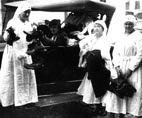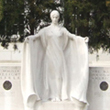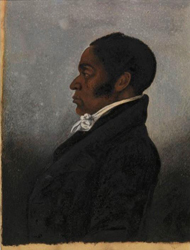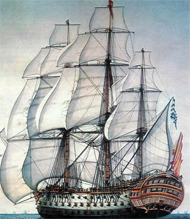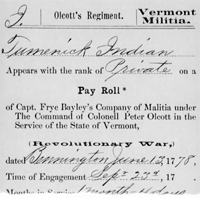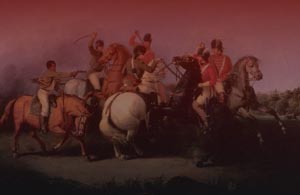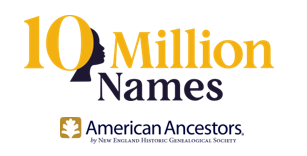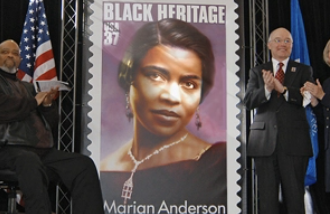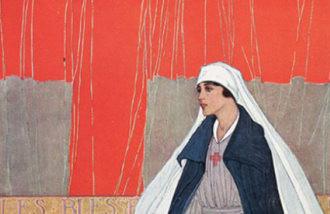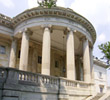African American Research
Spanish Research
Native American Research
Jewish Research
Researching Your African American Patriot
Research Your Lineage
Begin your search.
Start with yourself and go backwards, one generation at a time. Useful records to collect include birth, death, and marriage certificates; obituaries, cemetery records, and funeral cards; probate and land records; newspaper announcements; oral histories; military records and discharge papers; and federal and state censuses.
Work your way back to 1870.
For enslaved ancestors, the 1870 federal census is especially important because it is the first census taken after the Civil War and names all persons in a household.
For free ancestors, the 1850 federal census is the first census to name all persons in a household.
Not all African Americans were enslaved.
Approximately 15% of African Americans were free when the Civil War began in 1861.
Continue your research in other records.
Findings in pre-1870 records are built on research in post-1870 records. Seek out marriage settlements, probate distributions, and court records. Documenting lineage and service is easier in the New England states than in the Southern states.
Establishing Your Patriot Ancestor
Who served and how did they serve?
More than 5,000 African American or mixed descent patriots served in the American Revolution. Military service is credited to those who served in campaigns against the British between 19 April 1775 and 26 November 1783.
Civil Service is credited to those who conducted public business under the authority of the new federal, state, county, and town governments.
Patriotic Service is credited to those who took action to further, or demonstrate loyalty to, the cause of American independence, such as taking the oath of fidelity, paying supply taxes, providing supplies or monetary aid, or serving on a committee made necessary by the war.
Useful Sources
The following resources are available online or through interlibrary loan:
-
Freedman’s Bureau Marriage Records, 1815 – 1866
Available at www.familysearch.org -
Freedman’s Bank Records 1865 - 1871
Available at www.familysearch.org -
U.S. Southern Claims Commission Master Index 1871 – 1880
www.slcl.org -
U.S. federal censuses, 1790 – 1940
Widely available -
Amistad Research Center
www.amistadresearchcenter.org -
Records of Antebellum Southern Plantations from the Revolution through the Civil War, Kenneth M. Stampp.
Ongoing; microfilm via interlibrary loan -
Forgotten Patriots: African American and American Indian Patriots in the Revolutionary War, NSDAR
www.dar.org/library/fp.cfm
Researching Your Spanish Patriot
Can you trace your family back to those living in Nueva España during the American Revolution 1776 - 1783?
If so, you may be eligible for membership in the Daughters of the American Revolution.
Can You Trace Your Lineage To A Patriot Who Served In Spanish America?
DAR members have traced their ancestry back to more than 400 Spanish patriots of the American Revolution. These patriots were residents of either Spanish Louisiana or Nueva España. Nueva España included portions of the present day states of Texas, California, New Mexico, Colorado, and Arizona, as well as Mexico. Spanish forces also served in Cuba and other parts of the Caribbean. Ongoing research continues to identify new Spanish patriots.
How were these people involved in the American Revolution?
Donativos
In 1780, Carlos III, King of Spain, issued a Royal Decree that all subjects in Nueva España, or New Spain, make a voluntary contribution, in the form of a donation, to help fund the American Revolutionary War. Every citizen of Spanish America was asked to donate one or two pesos to the cause.
The Gálvez Expedition
Many Spanish patriots served under General Bernardo de Galvez in his Gulf Coast campaigns, including the Battles of Pensacola and Mobile. They were also stationed at militia posts throughout Spanish Louisiana. Some Spanish patriots were at the Battle of Fort San Carlos, in present day Saint Louis, and others were recruited from the Canary Islands to the Louisiana Infantry Regiment.
Texas Longhorn Cattle
Could your ancestor be one of the Texas cattlemen who supplied approximately 10,000 head of Texas longhorn cattle in response to a request by Gálvez in 1779? If so, you may have a Spanish patriot.
Useful Sources
The following resources are helpful for your research; however, a translator may be required as some are written in Spanish:
- The Canary Islanders of Louisiana, Gilbert C. Din
- La participación canaria en la formación y reclutamiento del batallón de Luisiana, Miguel Molina Martínez
- Spanish Records, Lists of Men Under General Don Bernardo de Gálvez in his Campaign against the British, 1779, C. Robert Churchill
- Honor and Fidelity, Jack D. Holmes
- José de Ezpeleta, Gobernador de la Mobila, 1780-1781, F. de Borja Medina Rojas
- The Texas Connection with the American Revolution, Robert H. Thonhoff
- New Mexico’s Contributions to the American Revolutionary Cause from Original Letters and Documents, 1779-1785, Harriett McCallum
- Cuba 1753-1815, Crown, Military and Society, Allan Kuethe
- The Journal of Don Francisco Saavedra de Sangronis, Aileen Moore Topping, translator, and Francisco Morales Padrón, editor
Tracing Your Lineage
When researching a Spanish Patriot, ask yourself the following questions:
- What do you know about that person?
- Where did he or she live?
- What type of Revolutionary War service did he or she perform?
Identifying who would be recognized as patriots through Spain’s contribution takes some detective work. It is best to start with the lineage by working your way back through the generations until you find a patriot.
When researching a Spanish patriot, you need to be aware of “What was Spanish America during the American Revolution?” This includes what is now the American Southwest, the Gulf Coast region and parts of the Central United States, and other areas, such as Mexico, Central America, South America, and Cuba.
Researching Your Native American Patriot
Can you trace your family back to those who lived during the American Revolution, 1775 - 1783?
If so, you may be eligible for membership in the Daughters of the American Revolution.
Native Americans In The American Revolution
During the 1700s, Native Americans faced many threats to their way of life, culture, and existence on the land that they had inhabited for many, many generations. European colonization and expansion often led tribes to choose sides in numerous conflicts and wars to protect their interests.
At the outbreak of the Revolutionary War, Native Americans in the east, south, and along the frontier once again had to weigh their options to protect their homes and have access to trade and supplies. Some chose the Loyalist side, some the Patriotic cause, while others tried to remain neutral. Often tribes were split.
Since the mid-1980s, the National Society Daughters of the American Revolution (NSDAR) has supported efforts to identify the names of Native Americans and individuals of mixed heritage who supported the American struggle for independence from Great Britain during the American Revolution. In the last thirty years, the NSDAR Library has greatly expanded its collection of resources for Native American lineage research.
The NSDAR Lineage Research Committee is also an excellent resource for assistance with Native American Research. This committee has identified specific genealogical research materials, both online and in print, to help you document your lineage and locate proof of service for Native Americans who contributed to the American Revolution.
You are encouraged to document your Native American Patriot and submit an application for membership on these lines.
Steps to Begin Native American Lineage Research
- Start with yourself and work your way back, one generation at a time.
- Document as you go.
- These types of records will be very helpful: US federal, state, and county records, US Federal Indian records, US Federal Indian Census Rolls, Bureau of Indian Affairs, State records for non-federally recognized tribes and Tribal Records
- As you progress, identify tribe, time frame, and location.
- Learn the culture, beliefs, and history of the tribe; this will help direct your research as you work back on your lineage.
Could You Have A Native American Ancestor?
Hopefully, your family has documented proof of Native American Heritage. But if not, other possible clues may be:
- Family stories told by your parents, grandparents, or other family members.
- Customs, habits, words or phrases, distinctive dress, or traits that you have known since childhood.
- Family talk or memorabilia of a specific Native American tribe.
- Location of your ancestors’ home near Native American land and communities.
- Family naming patterns.
- Time frame and destination of family migration.
- Family members missing from traditional genealogical records.
- The smallest piece of information may be the key!
Researching Your Jewish Patriot
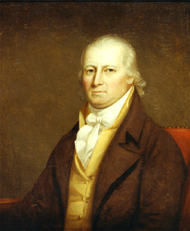 Research Your Lineage
Research Your Lineage
Getting Started
The first step is to collect information on your family. Start with yourself and work backwards, one generation at a time.
List the names, birth dates, marriage dates and death dates of your ancestors along with the location (town, county, and state) where each event occurred.
In Jewish family research, given names are particularly important as they provide name-pattern clues. Depending on whether a child is named in honor of a deceased or living ancestor reveals Sephardic or Ashkenazi origins; Sephardic Jews name children after the living, and Ashkenazi Jews name children after the deceased.
Those with Sephardic origins were typically from Spain, Portugal, or countries surrounding the Mediterranean, including North Africa. Ashkenazi origins represent Jews from central and eastern Europe. The majority of colonial-era Jewish Americans were of Sephardic origin, and there are different resources and strategies for documentation. Today, most American Jews are of Ashkenazi origin with ancestors who arrived in the United States after 1880.
Begin collecting records such as birth, marriage and death certificates. Look for obituaries, wills and probate distributions, land records, newspaper articles, and synagogue and cemetery records.
Interview older members of your family, such as great-aunts and uncles as they may have additional information or documents.
Oral histories or family traditions may or may not be accurate, but often provide clues to finding the necessary documentation.
Establishing Your Patriot Ancestor
Who served and how did they serve?
During the American Revolution, Jews lived throughout the original thirteen colonies with the highest concentrations in Baltimore, Charleston, New York City, Newport, Philadelphia, and Savannah. Many went to Connecticut in the evacuation of New York City.
Although Jews were less than 1% of the population by 1775, their contributions to the Revolutionary War effort were significant. Jews served in the military, took the oath of allegiance, provided goods and supplies, lent money to the American cause, and more.
Many Jewish Patriots have already been proven, with more still to be documented.
Useful Sources
The following resources are available online or through interlibrary loan:
- “Bibliography of Materials Relating to Rhode Island Jews in Rhode Island Depositories”, comp. Freda Egnal, RI Jewish Historical Notes, Vol 4, No. 4, Nov. 1966
- First American Jewish Families, 3rd ed., Malcolm Stern
- Jews of Philadelphia: Their History from the Earliest Settlements to the Present Time, Henry Samuel Morais
- Jews and the American Revolution: Haym Salomon and Others, Laurens R. Schwartz
- New York Jews in the Struggle for American Independence, Leon Huhner
- The American Jew as Patriot, Soldier, and Citizen, Simon Wolf
- The Colonial American Jew, 1492-1776, Vol. III, Jacob R. Marcus
- The Jews of South Carolina from the Earliest Times to the Present Day, Elzas A. Barnett
- Unrecognized Patriots, The Jews in the American Revolution, Samuel Rezneck
Tracing Your Lineage
Can you trace your lineage back to a Patriot who served in the Revolutionary War?
A small sampling of possible Patriots…
Mordecai Abrahams (VA)*
Abraham Alexander (SC)*
Solomon Bush (PA)
David Nunez Cardoza (SC)*
Gershom Cohen (SC)*
Jacob Cohen (VA)*
Isaac Da Costa (SC)*
David Emanuel (GA)*
Michael Gratz (PA)*
Jacob Isaacs (RI)*
Hayman Levy (PA)*
Samuel Mendes Marks (SC)*
Abigail Minnis (SC)
Philip Minnis (GA/SC)*
Samuel Mordecai ((SC)*
Myer Myers (CT/NY)*
Samuel Myers (NY)*
Simon Nathan (PA)*
Benjamin Nones (PA)*
Jacob Phillips (SC)*
Jonas Phillips (PA)
Solomon Pinto (CT)*
Phillip Moses Russell (PA)*
Elias Pollock aka Joseph Smith (MD)
Francis Salvador (SC)
David Sarzedas (SC)
Haym Salomon (PA)*
Gershom Mendes Seixas (CT/NY/PA)*
Benjamin Mendez Seixas (NY)*
Mordecai Sheftall (GA)*
*DAR established Patriot
Eligibility for Membership
Any woman 18 years or older - regardless of race, religion, or ethnic background - who can prove lineal, bloodline descent from an ancestor who aided in achieving American independence is eligible to join the DAR. She must provide documentation for each statement of birth, marriage, and death, as well as of the Revolutionary War service of her Patriot ancestor.
There are nearly 3,000 DAR chapters in all 50 states, the District of Columbia, and several foreign countries.
For more information, contact
Specialty Research Committee [email protected] www.dar.org/national-society/genealogy/specialty-research National Society Daughters of the American Revolution 1776 D Street, NW Washington, DC 20006-5303 (202) 628-1776 www.dar.org

